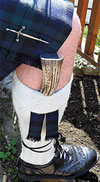The French words mur (wall) mûr (ripe; mature) and mûre (blackberry; mulberry) are written differently but pronounced the same – [myʁ], so are only distinguished by context in speech.
The word mur (wall) comes from the Latin mūrus (wall), from the Old Latin *moerus/*moiros, from the Proto-Indo-European *mei (to fix, to build fortifications or fences) [source].
The word mûr (ripe; mature) comes from the Latin mātūrus (mature; ripe; early), from the Proto-Indo-European root *meh₂- (to ripen, to mature) [source].
The word mûre (blackberry; mulberry) comes from the Vulgar Latin mora (mulberry), from the Latin mōrum (mulberry) from the Ancient Greek μόρον (móron – mulberry; blackberry) from the Proto-Indo-European *moro (mulberry; blackberry). [source].
One Welsh word for wall, mur [mɨ̞r/mɪr], comes from the same root as the French word mur, probably via Norman or Latin. Another word for wall in Welsh is wal, which was probably borrowed from English. The word pared is used for interior walls, though only in literary Welsh. This probably comes from the Latin pariēs (wall) from the Proto-Indo-European *sparri (wall), which is also the root of the Spanish word pared (wall), the Portuguese parede (wall), and similar words in other Romance languages [source].
The word wall comes from the Old English weall (wall, dike, earthwork, rampart, dam, rocky shore, cliff), from the Proto-Germanic *wallaz/*wallą (wall, rampart, entrenchment), from the Latin vallum (wall, rampart, entrenchment, palisade), from the Proto-Indo-European *wel- (to turn, wind, roll) [source].

